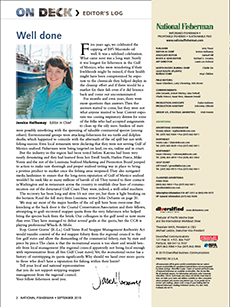Well done
By Jessica Hathaway
Five years ago, we celebrated the capping of BP’s Macondo oil well. It was a subdued celebration. What came next was a long wait. Surely it was longest for fishermen in the Gulf of Mexico, who were wondering if their livelihoods might be ruined, if their health might have been compromised by exposure to the chemicals they helped deploy in the cleanup effort, and if there would be a market for their fish even if it did bounce back and come out uncontaminated.
For months and even years, there were more questions than answers. Then the answers started to come, but they were not what anyone wanted to hear. Corexit exposure was causing respiratory distress for some of the folks who had accepted assignments to clean up the oily mess. Sunken oil mats were possibly interfering with the spawning of commercial species (among others). Environmental groups were attacking fishermen for turtle and dolphin deaths, which happened to coincide with the aftermath of the oil spill but not with fishing seasons. Even local restaurants were declaring that they were not serving Gulf of Mexico seafood. Fishermen were being targeted on land, on sea, online and in court.
But the industry in this region had been tested before. Katrina had been very nearly devastating, and they had learned from her. The Louisiana Seafood Marketing and Promotion Board jumped to action to make sure thorough and proper seafood testing was in place to bring a pristine product to market once the fishing areas reopened. They also navigated media landmines to ensure that the long-term reputation of Gulf of Mexico seafood wouldn’t be sunk like so many millions of barrels of oil. They turned to their contacts in Washington and in restaurants across the country to establish clear lines of communication out of the devastated Gulf Coast. They were, indeed, a well-oiled machine.
The recovery is not over yet, but there is light breaking on the horizon. Read the full story from Louisiana writer John DeSantis on page 20.
We may say most of the major hurdles of the oil spill have been overcome. But knocking at the back door is the Coastal Conservation Association and their fellows, attempting to grab recovered snapper quota from the very fishermen who helped bring the species back from the brink. Our colleagues in the gulf need us now more than ever. They have managed to defeat several grabs at this quota, but the CCA is playing professional Whack-A-Mole.
Rep. Garret Graves’ (R-La.) Gulf States Red Snapper Management Authority Act would transfer control of the red snapper fishery from the regional council to the five gulf states and allow the dismantling of the commercial fishery, state by state and piece by piece. The claim is that the recreational season is too short and would benefit from local management (the regional council apparently not being local enough with representatives from all five states). Yet, the recreational sector has a history of outstripping its quota. Why should we hand over more quota to those who don’t have a reputation for fishing within their limits?
Tell your local and national representatives you do not support stripping snapper management from the regional council. Your fellow fishermen need you.








